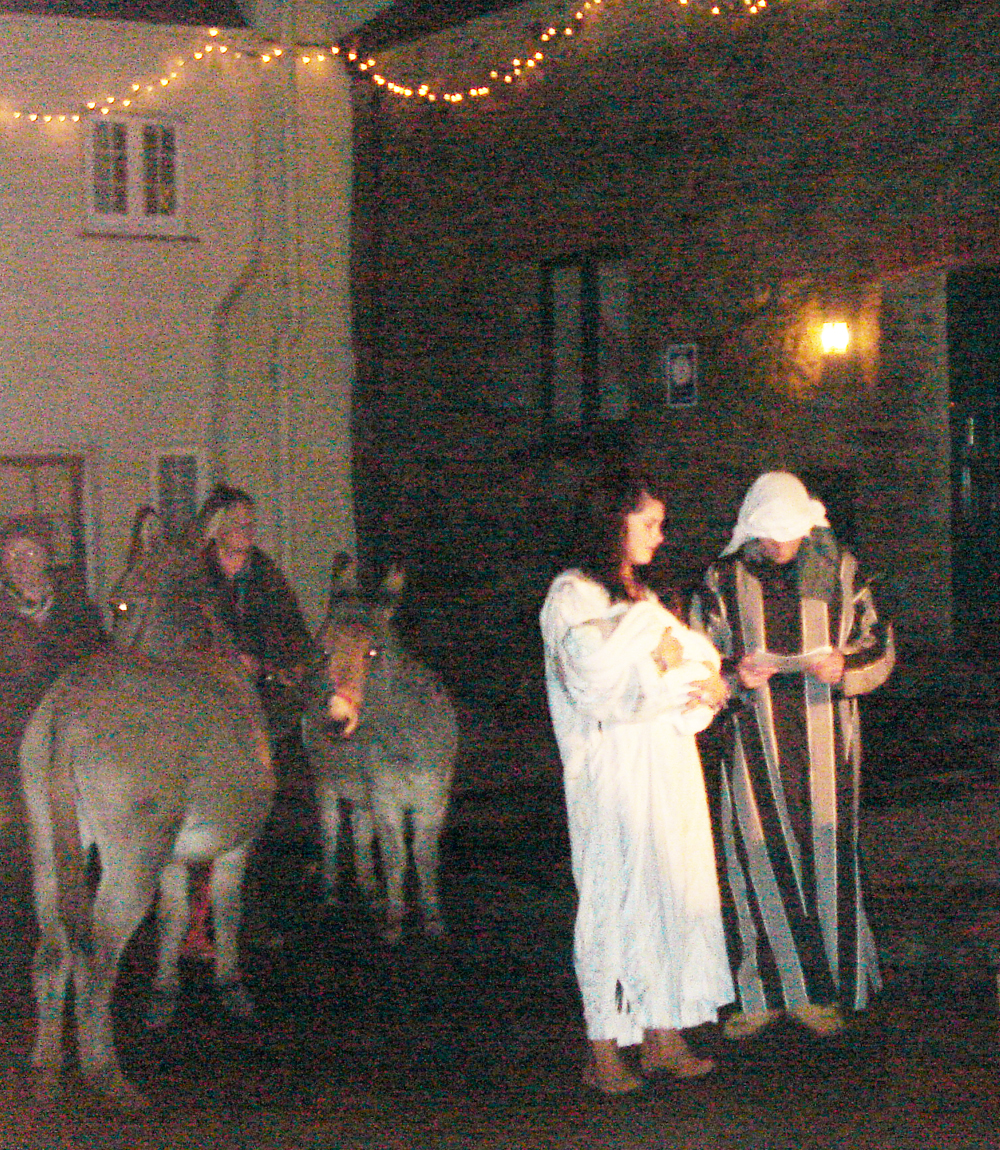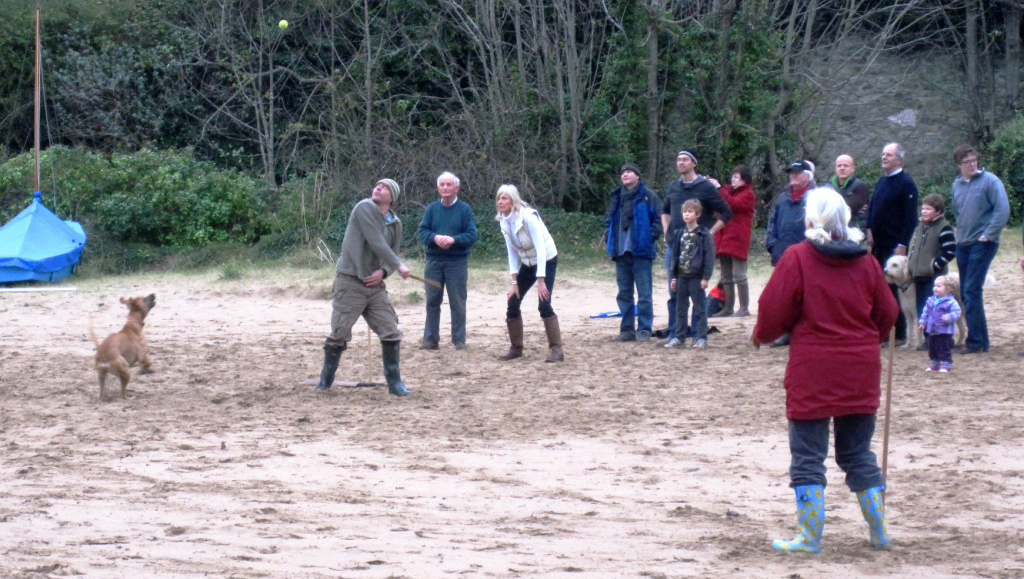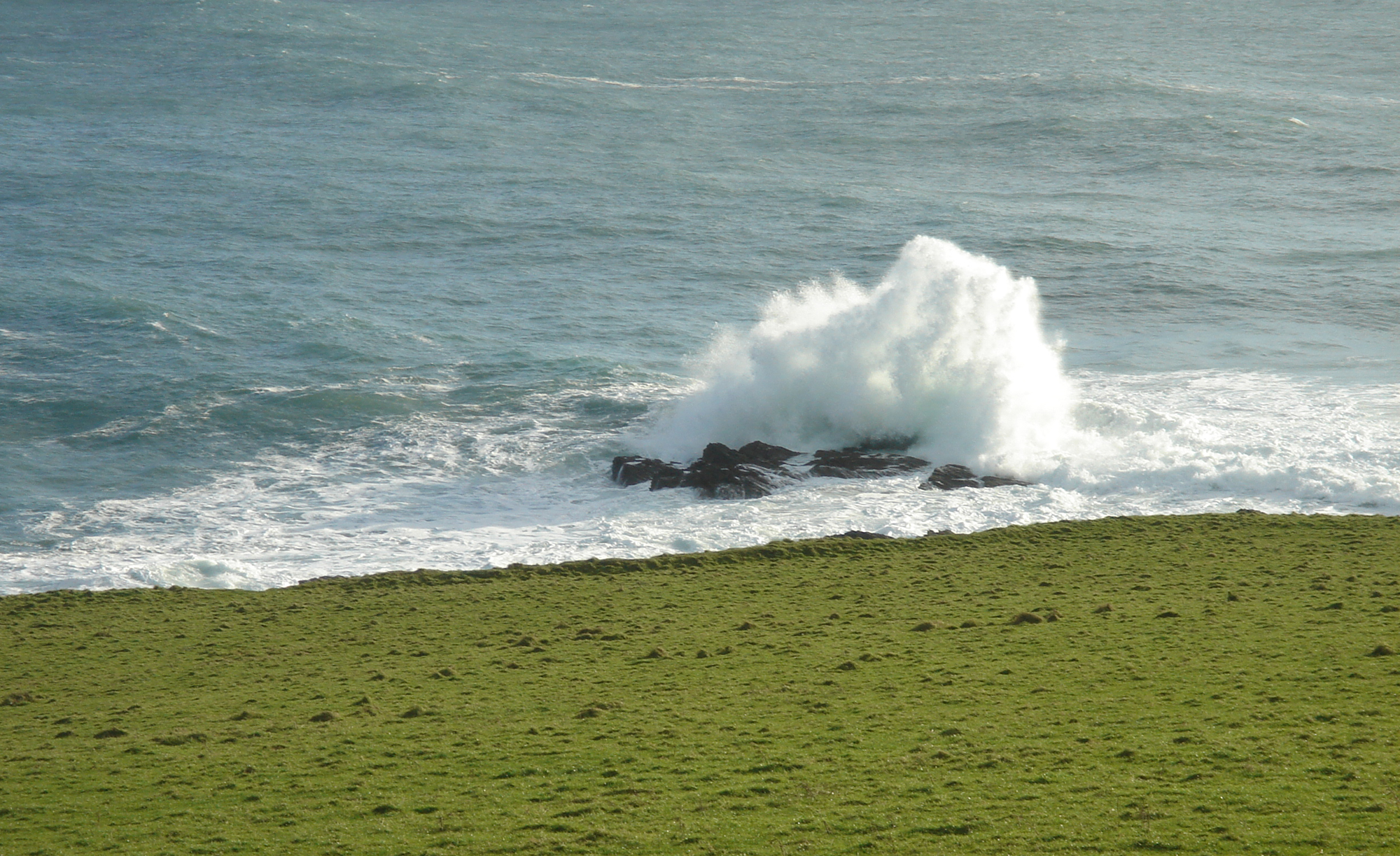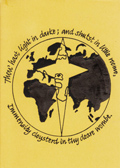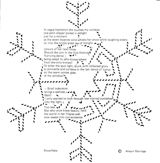Until ten years ago I’d never spent Christmas in the country, so the last ten Christmases have been full of new delights. Looking ahead to this one, it didn’t cross our minds that it might be the wettest Christmas on record; but fortunately the crazy weather didn’t spoil our enjoyment. I thought I’d share some of the many delights and maybe even the few drawbacks of a village Christmas.
There had been several festive gatherings in the last few weeks, and a traditional Christmas Carol Service was held in the church on Sunday 16th December, but the celebrations began in earnest on Thursday 20th, when our local pub staged their version of the Nativity play for the sixth year running. This year we had not only two donkeys and a sheep with its new-born lamb, but also a three-week-old baby to play the part of Jesus.
The various parts were played by staff and regulars from the pub, and they managed to combine a healthy dose of humour and earthiness with a fitting reverence for the story they were telling;
and the whole experience was further enhanced by the presence of the local Silver Band, which made sure that we all sang the carols with appropriate gusto.
After a very enjoyable evening, some of us moved on to the pub in the next village, to join in one of their regular folk nights. A couple of dozen local people meet here every fortnight to play and sing to each other in an extremely relaxed atmosphere, and the instruments on this particular evening included a dulcimer, several accordions, guitars and bodhrans (hand drums), and a couple of violins. Among the singers was a group of burly men called the Gaffers who sing a range of unaccompanied songs with enthusiasm, harmony and humour.
Rather than celebrating with Midnight Mass at the village church, we had a Christmas Eve service of Communion by Extension at 10.00pm. This is, of course, a direct result of the fact that our church is one of nine churches in what is known as a Joint Benefice. The fact that we have one priest for all nine churches is one of the disadvantages of living in a rural area, and it does, unfortunately, mean that going to church can sometimes be a rather less than satisfactory experience. Those who live in the country have the same needs, hopes, aspirations and spiritual hungers as those who live in larger centres of population, so it saddens me when they are offered only a meagre diet of religion.
After the service, we moved down to the pub to sing more carols and wish each other a happy Christmas. As midnight struck, many of us were still sitting outside, enjoying and marvelling at the unexpected warmth.
As well as all the music, many of us spend a considerable amount of time out walking, and despite the weather forecasts, we managed to stay dry most of the time and even had some lovely warm spells of sunshine. Another highlight of the village calendar is the Rounders Match on Boxing Day, when crowds of us from the village, plus friends and visitors, gather on the beach for an energetic game in which the men’s and women’s teams fight it out for the most rounders. In the last ten years we have had snow and ice such that we had difficulty banging the posts into the sand, and sunshine warm enough to force us to strip down to our tee shirts, but we had never been rained off before. We were a little indignant, therefore, when the rain began just as we parked the car, and by the time we were on the beach it was in extreme wetting mode. We therefore retreated to the car park, and seven of us squeezed into our camper van to enjoy mulled wine, mince pies, talk and laughter. I include here a picture from last year to show what it is normally like, and one to show how we dealt with the conditions this year.

If I don’t write poetry for a few days, the creative urge tends to squeeze out in other ways, including the culinary; so when the time came to make some mince pies, I found a Christmas regatta emerging from my oven.
So what are the positive and negative aspects of spending Christmas in a small English village in the 21st century? I’ve already mentioned the limitation of being part of a church that doesn’t feel it necessary to invest in small rural communities. This will not be of concern to non-church-goers; but for those of us for whom Christmas is first and foremost a religious festival, it is quite a disadvantage. As in other communities, people in a village sometimes fall out with each other: but unlike in larger centres of population, they generally find that they have to get over it quite quickly and give a high priority to living in harmony with their neighbours; so that turns out, after all, to be more positive than negative.
The other positive aspects of our village Christmas are almost too numerous to mention. I’ve given some indication of the range of activities that take place in the village, and they are all community-based rather than being organised from above. That doesn’t mean that they don’t involve effort and commitment, but those characteristics are not in short supply here. We know the shop keepers and the postman, and it is warming to arrive home to find a little note from the postman telling us where he’s left a parcel, and who it is to.
On top of all this, we live completely surrounded by the beauty and splendour of the natural world at its richest and most varied. Nature has shown its force again this Christmas, so several homes have been flooded and landslides have broken a number of our banks. But we know that every time we leave the house we will breathe clean air, feel the elements on our faces, meet wildlife and see beauty. This week we have met a seal down near the beach, watched a wide range of birds, caught sight of a vole, been almost deafened by the crashing of waves, and sat on the sand soaking up the welcome sunshine.
So I end with two pictures from our Christmas Day walk, and wish you all the very best for 2013. We’ll have to start preparing for our long sea voyage in a couple of weeks’ time, but for a few more days we’ll be enjoying life in our lovely village.
